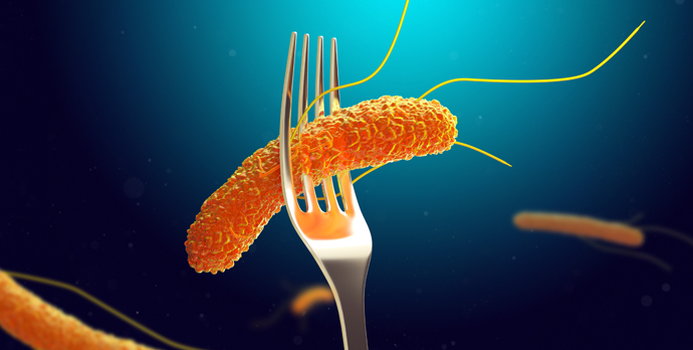Food poisoning can have many symptoms including upset stomach, fever, diarrhea, chills, headaches, severe cramps, dehydration, vomiting and even death. Foodborne illnesses can even lead to some long-term health problems. Symptoms often differ between people and vary in their length or intensity, even went expose to the same contaminated food.
To avoid food poisoning, you need to practice safe food preparation, cooking and storage to avoid bacterial growth or contamination. Bacteria can multiply into trillions quickly when it is left at the right environmental conditions to grow. Bacteria grown most quickly 40 and 140 degrees F and they live everywhere, on your skin, bottoms of shoes, on cell phones, handbags and keyboards. They thrive in warm moist conditions.
Bacteria like foods from animal sources, they can also grow well on produce that has been contaminated by soil, animals, water or handling practices. Food and water that is contaminated by bacteria are common but you can also get sick from parasites and viruses too.
Some common food borne contamination can be caused by E. coli, cholera and salmonella, or protozoans (i.e. giardia and cryptosporidium), or viruses (i.e. hepatitis A, polio and rotavirus).
The general rule for avoiding food poisoning, especially when traveling, is wash it, peel it and cook it thoroughly.
Things to Avoid When Drinking
- Avoid tap water when traveling to countries without safe tap water
- Ice made from contaminated tap water
- Fountain drinks that use contaminated tap water, buy bottled soda instead
- Juices or dairy-based drinks made with contaminated water
- Unpasteurized milk
Safer Drinking Choices
- Hot coffee and tea from water that has been boiled
- Water that has been treated, boiled and/or filtered
- Bottled and filtered water, soda, beer, wine and sports drinks are safer choices
- Ice made from purified water
Things to Avoid When Eating
- Food that is held at unsafe temperatures for long periods of time
- Buffets with food cooked food not kept in warmers
- Salads or uncooked vegetables
- Undercooked fish or meats, ensure your animal foods get cooked medium-well or well-done
- Unwashed fruits and vegetables that have not been washed
- Undercooked eggs
- Condiments that are not pre-packaged or are made with fresh ingredients like salsa
- Dairy products that are unpasteurized
- Popsicles or flavored ice using contaminated water
- Limit street food cooked in unsanitary conditions or held for long periods without refrigeration
- Cold meat and cheese platters
- Unsealed mayonnaise
Safer Food Choices
- Food that is made-to-order and served hot
- Hard Boiled eggs
- Fruits and vegetables that you are able to wash in clean water and peel
- Pasteurized dairy products
- Nuts or shelled foods
- Cooked vegetables
- Thoroughly cooked animal foods



